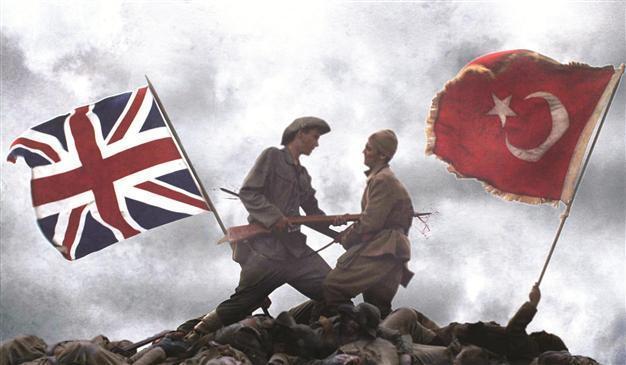Surge of films on Gallipoli Campaign
Emrah Güler ANKARA - Hürriyet Daily News

Sinan Çetin’s ‘Çanakkale Çocukları’ follows a mother after she has a nightmare in which she sees her two sons killing each other in the Gallipoli trenches.
The Gallipoli Campaign, or the Battle of Çanakkale, is at once one of the most tragic battles of the 20th century and one of the greatest victories of modern Turkey. The attack of the Allied Forces in World War I to capture the Dardanelles, (the Çanakkale Strait), resulted in a huge defeat and lead to the death of more than 130,000 Turkish, British, French, Australian, New Zealand and Indian troops in eight months.
The campaign helped the Turks regain a confidence that would eventually inspire the Turkish War of Independence and the founding of modern Turkey eight years later. The centenary of the Gallipoli Campaign is just around the corner, and moviemakers look set to cash in on the nationalist tendencies invading Turkish cinema and T.V. screens in recent years.
Most of the recent historical dramas are examples of crude nationalism, most clearly seen in the recent box office smash “Fetih 1453” (Conquest 1453) - an epic tale of the Ottoman conquest of Constantinople - or the hit T.V. series “Muhteşem Yüzyıl” (Magnificent Century), depicting the power games in the 16th century court of Süleyman the Magnificent. Even the upcoming adaptation of the 1960s comic book “Karaoğlan” features a young Turkic hero during the reign of Genghis Khan in 12th century Central Asia.
It is therefore no surprise that a big production on the Gallipoli Campaign is hitting theaters this week and another is on its way in less than a month. “Çanakkale Çocukları” (Children of Gallipoli) is directed by popular filmmaker Sinan Çetin. More a one-man-show than an auteur, Çetin directs, produces, writes and is the cinematographer of the war drama, while his wife and two sons star.
The film follows a mother after she has a nightmare in which she sees her two sons killing each other in the Gallipoli trenches. The mother being Australian, the father being Turkish, and with two sons, Osman and James, this is all quite plausible, at least as far as movie scripts go. “Can a mother’s cry stop the war?” is one of film’s taglines, and describes its premise in a nutshell.
More films to comeAnother tagline for the film is “Long live the children, too,” hinting at the film’s anti-war stance. Indeed, “Çanakkale Çocukları” is all about showing the atrocities of war, asking us to remember that the soldiers, no matter which side they are on, are also sons. However, the messages are much too blatant, and the dialogue more often than not simply descends into lecturing.
The other film on the Gallipoli Campaign to be released next month is Yeşim Sezgin’s “Çanakkale 1915.” The film is adapted from the book “Diriliş” (Resurrection) by Turgut Özakman, the writer of the biggest selling history book in Turkey, “Şu Çılgın Türkler” (Those Crazy Turks) and the screenwriter of 2010’s dry, uninspired biopic of Atatürk, “Dersimiz Atatürk” (Today’s Lesson, Atatürk). The film will most definitely show a more nationalist tone, focusing on the glory of the battle as it led to the War of Independence and hence, modern Turkey. Expect plenty of epic war scenes as among the production team are two Oscar-winning visual effects companies, which also worked on “Titanic.”
The coming years will see a further surge in feature films on the Gallipoli Campaign with two also sure to directly target nationalist sentiments. One of these is “Çanakkale Geçilmez” (Çanakkale Cannot Be Passed) by Faruk Aksoy, the director who brought us “Fetih 1453,” and the other, “57’nci Alay” (57th Regiment) from Mahsun Kırmızıgül, once the king of exploitative “arabesque” music and now the director and writer of big budget films on sensitive social issues like the Kurdish problem and global Islamophobia.
Another movie in production is “Çanakkale İçinde” (In Çanakkale), perhaps the most promising of the three. Directed by the experienced and critically-acclaimed Serdar Akar, the film is set to star Mel Gibson as a British commander. Gibson also starred as an Australian soldier in Gallipoli in Peter Weir’s 1981 movie “Gallipoli.”
While the surge of feature films about the Gallipoli Campaign will continue, one documentary will probably see its DVD sales rise in the coming years. Director and writer Tolga Örnek’s “Gallipoli: The Front Line Experience” of 2005 is a powerful documentary on the campaign. Narrated by Sam Neill and Jeremy Irons, the documentary uses archival photos, film footage and dramatization. The real impact of the film perhaps lies in its use of the letters and diaries of 10 soldiers - British, Australian, Kiwi and Turkish - turning it into a strong anti-war statement.
